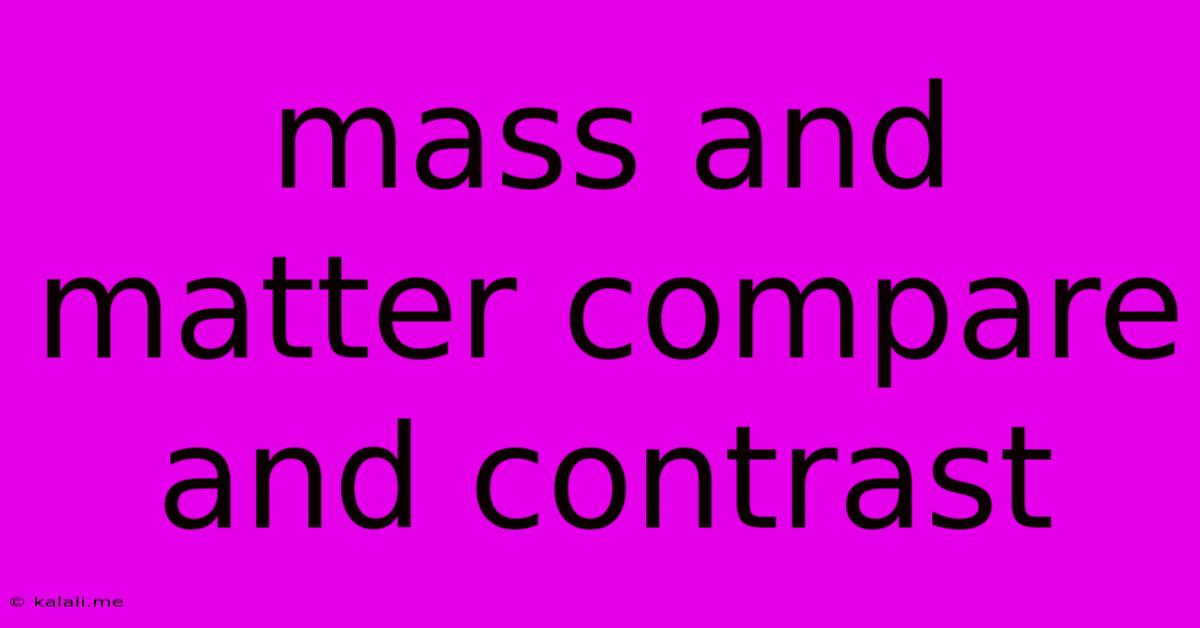Mass And Matter Compare And Contrast
Kalali
Jun 15, 2025 · 3 min read

Table of Contents
Mass vs. Matter: A Detailed Comparison and Contrast
Meta Description: Understand the subtle yet crucial differences between mass and matter. This article delves into their definitions, properties, and relationships, clarifying common misconceptions. Learn how they relate to concepts like weight, volume, and density.
Mass and matter are two fundamental concepts in physics that are often used interchangeably, leading to confusion. While closely related, they are distinct entities with unique characteristics. This article aims to clarify the differences and similarities between mass and matter, providing a comprehensive understanding of these core scientific concepts.
What is Matter?
Matter is anything that occupies space and has mass. It's the physical "stuff" that makes up the universe – everything you can see, touch, or feel. Matter exists in various states, including solid, liquid, gas, and plasma. Key properties of matter include:
- Volume: The amount of space matter occupies.
- Mass: A measure of the amount of matter in an object.
- Density: Mass per unit volume.
- Inertia: Resistance to changes in motion.
Examples of matter include: rocks, water, air, humans, planets, and stars. Essentially, if it has physical presence, it's matter.
What is Mass?
Mass is a scalar quantity representing the amount of matter in an object. It's a fundamental property that determines an object's resistance to acceleration (inertia). A larger mass means greater inertia; it requires more force to change its velocity. Unlike weight, mass remains constant regardless of location. This is because mass measures the inherent amount of matter, while weight is affected by gravity.
Important characteristics of mass include:
- Invariant: It doesn't change with location or gravitational pull.
- Additive: The total mass of a system is the sum of the masses of its components.
- Related to Inertia: A larger mass implies greater resistance to changes in motion.
Mass vs. Matter: Key Differences
While mass is a property of matter, they are not the same thing. The primary distinction lies in their nature:
| Feature | Mass | Matter |
|---|---|---|
| Definition | Amount of matter in an object | Anything that occupies space and has mass |
| Nature | Scalar quantity | Physical substance |
| Measurable? | Yes, using a balance or scale | Yes, by measuring volume and mass |
| Dependence on Gravity | Independent | Indirectly dependent (through weight) |
| Units | Kilograms (kg), grams (g) | Kilograms (kg), liters (L), cubic meters (m³) |
The Relationship Between Mass and Weight
It's crucial to differentiate between mass and weight. While closely related, they are not interchangeable.
- Mass is an intrinsic property of an object. It's a measure of the amount of matter it contains and remains constant regardless of location.
- Weight, on the other hand, is the force of gravity acting on an object's mass. Weight varies depending on the gravitational field strength. For instance, an object weighs less on the Moon than on Earth because the Moon's gravitational pull is weaker.
Conclusion
Understanding the distinction between mass and matter is vital for grasping fundamental physical concepts. While mass is a property inherent to matter, they are not synonymous. Matter encompasses all physical substances, while mass quantifies the amount of matter present. This clarification helps avoid common misconceptions and provides a more accurate understanding of the universe's building blocks. By grasping these concepts, one can better understand related topics such as density, inertia, and the relationship between mass and weight.
Latest Posts
Latest Posts
-
Least Common Multiple Of 15 And 40
Jun 15, 2025
-
Is University Of Minnesota Test Optional
Jun 15, 2025
-
Acids Turn Litmus Paper What Color
Jun 15, 2025
-
Difference Between Iteration And Recursion In C
Jun 15, 2025
-
Least Common Multiple Of 12 And 22
Jun 15, 2025
Related Post
Thank you for visiting our website which covers about Mass And Matter Compare And Contrast . We hope the information provided has been useful to you. Feel free to contact us if you have any questions or need further assistance. See you next time and don't miss to bookmark.